- 6 August 2016
- India
-
(아시아/인도) 왜 인도의 이발소는 특별한 제도인가?국제문제/아시아 2016. 8. 7. 15:30출처: http://www.bbc.com/news/world-asia-india-36853922
Why the Indian barbershop is a unique institution 왜 인도의 이발소는 특별한 제도인가?
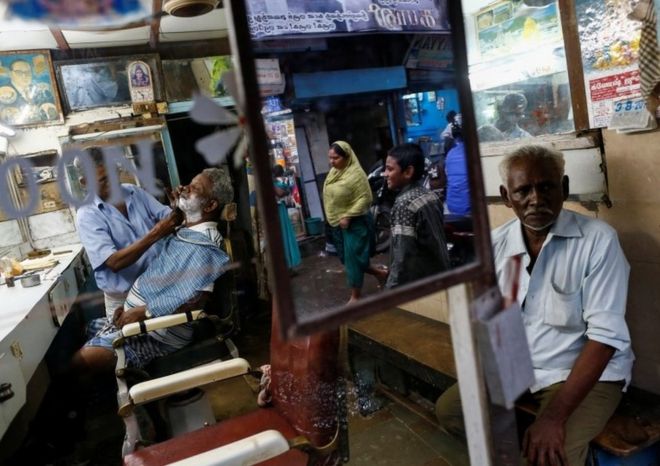 REUTERS
REUTERSIt takes very little investment to start a roadside barbershop in India The barbershop has made itself into a unique Indian institution. Apart from the usual business of shaving and hair cuts, it also serves other social purposes, writes author Palash Krishna Mehrotra.
Most Indians don't believe much in professional psychiatrists. You don't pay good money to someone just so he can listen to you ramble about your problems for an hour.
Business analysts never cease to remind us that India is a price-conscious market. You put anything in a five-rupee (seven cents; five pence) sachet - ketchup, digestive cookies or shampoo - and it will sell.
For the average Indian, the friendly neighbourhood barber also doubles as the psychiatrist. We pour our hearts out to the barber, never mind the lack of privacy. It's a classic two-for-one deal.
The barbershop also acts as a community centre for unemployed youth. During the course of an average day, young men are constantly in and out of the shop - no, not to get a shave, but just to comb their hair. It's free of cost and the barber doesn't mind.
They also drop in to watch cricket matches. on one such day, when a World Cup semi-final was on, I found an old man perched on a chair outside the barbershop, his ear glued to a transistor. He didn't care much for television.
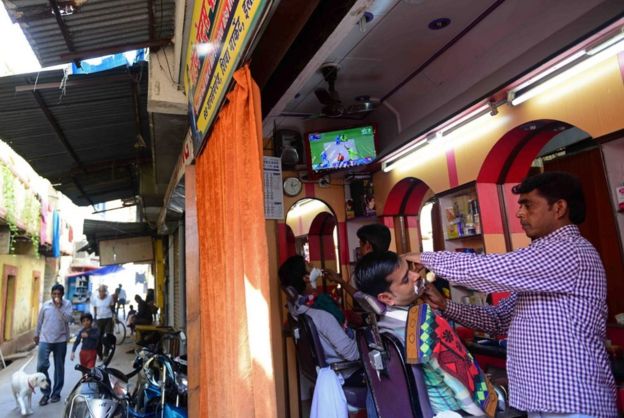 GETTY IMAGES
GETTY IMAGESMost barbershops keep TV sets to provide entertainment for their customers He said he came to the barbershop every day in the afternoon and sat there till about 5pm, reading newspapers, listening to the radio and watching the world go by. There you are - the barbershop as an old people's home.
But barbershops have changed slightly over the years, nothing tectonic though, just small changes.
Bollywood magazines like Filmfare, Stardust and Cine Blitz are still there. Earlier, the hairstyles were copied from these magazines, but now saloons have posters of Caucasian men sporting alien European or American styles. In the 1980s, millions of Indians copied Anil Kapoor, who played the quiz master in Oscar-winning Slumdog Millionaire.
He's carried the same haircut into the American TV series 24, but the man on the street now imitates cricket stars more than film stars.
The blue tube of V-John shaving cream, endorsed by Bollywood star Shahrukh Khan, is very much on the shelves. Popular brand Axe has replaced the venerated Old Spice aftershave.
The transistor which was always tuned to Vividh Bharati, the state-owned station, playing popular Hindi film songs, has made way for the LED TV, slotted into a corner near the ceiling.
Barbers across northern India watch only two shows: Crime Patrol and Savdhaan (Alert) India, both of which dramatise real life stories of adultery, murder and crimes of passion.
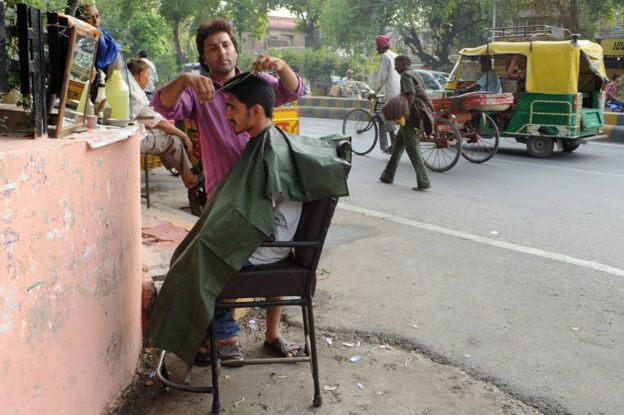 GETTY IMAGES
GETTY IMAGESStreet barbershops are usually very cheap Often, while shaving, what will happen is that the barber will twist your face into an odd position, left ear squeezed into left shoulder, so he can reach the difficult corners.
At that very moment, the episode of Crime Patrol will take an unexpected turn. You are abandoned in your contorted position, while the story plays out, or there's a commercial break.
All work comes to a standstill until then. You are meant to stay in that position until the barber has finished watching the segment.
There is the odd barber who doesn't want to watch Crime Patrol and switches to the Discovery Channel in Hindi. At which point he is shouted down by the other barbers: "What are you doing? Go back to Crime Patrol. Abbas, yaar (friend), you're not a child anymore, what's with the silly dolphins?"
Barber shops these days have diversified into areas beyond the haircut and the shave. In Delhi's Humayunpur, which is a fascinating melting pot of young people from north-eastern India and Africa, I once got a "face massage". Next morning, my face had transmogrified into a giant pimple.
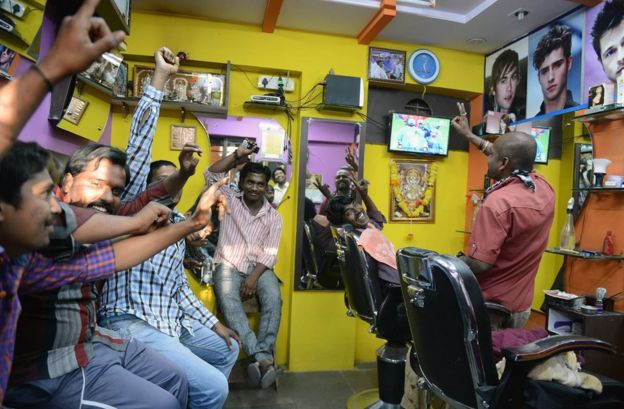 GETTY IMAGES
GETTY IMAGESPeople often watch cricket matches in barbershops While I was getting my face scrubbed, another customer walked in, stripped to his waist and raised his hands. I thought it was a hold-up.
But the barber knew what to do. He whipped out a trimmer and started running it over the man's chest and back. Body hair has gone out of fashion.
There's also something called the "unisex" saloon. When I visited one in Allahabad, a city on the banks of the Ganges river, the boys were noticeably more uncomfortable than the girls. They looked nervous and self-conscious, sitting straight, as if they couldn't wait to get it over with. These saloons lack the personal touch and seldom have a loyal clientele.
The door-to-door barber is a dying breed. In the old days, he also doubled as a matrimonial agent or marriage broker, carrying news of eligible bachelors and brides to the households he visited. He, unfortunately, has been replaced by the Tinder app.
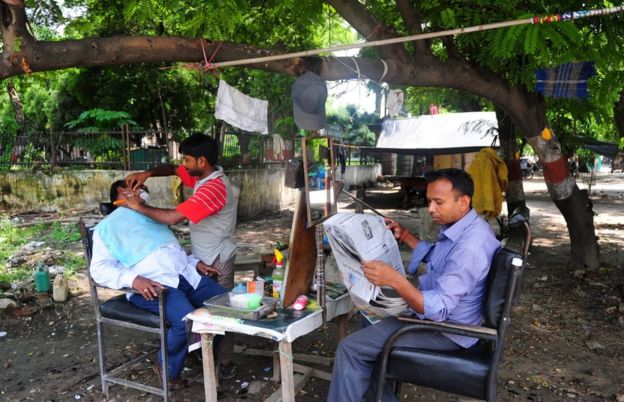 GETTY IMAGES
GETTY IMAGESAnd sometimes one has to wait patiently for his turn There is one last variety of barber that I haven't mentioned - the under-the-tree barber. I have often thought of switching to one of them, largely because he doesn't have a TV and there's no Crime Patrol to distract him from his job.
But then the Indian bazaar has so much going on in it that he could be distracted by something else: a passing pushcart of mangoes, a minor accident involving a bicycle and a scooter, a pretty woman in a sari.
It only takes a moment's distraction and you're nicked with the old straight razor. No, I won't risk that, not even if I had to do a piece on barbers for the BBC.
'국제문제 > 아시아' 카테고리의 다른 글
(아시아) 남북한 체조선수 올림픽 기념셀카 찍다 (0) 2016.08.10 (아시아) 일본왕 아키히토 퇴위 시사 (0) 2016.08.09 (아시아/인도) 부르한 와니의 사망에 격분한 카슈미르 시위로 36명 사망 (0) 2016.07.23 (아시아) 캄보디아와 한국의 2015년도 1인당 GDP 비교 (0) 2016.07.17 (아시아/인도) 인도 배후의 어두운 역사와 영국이 즐기는 음료 (0) 2016.07.16